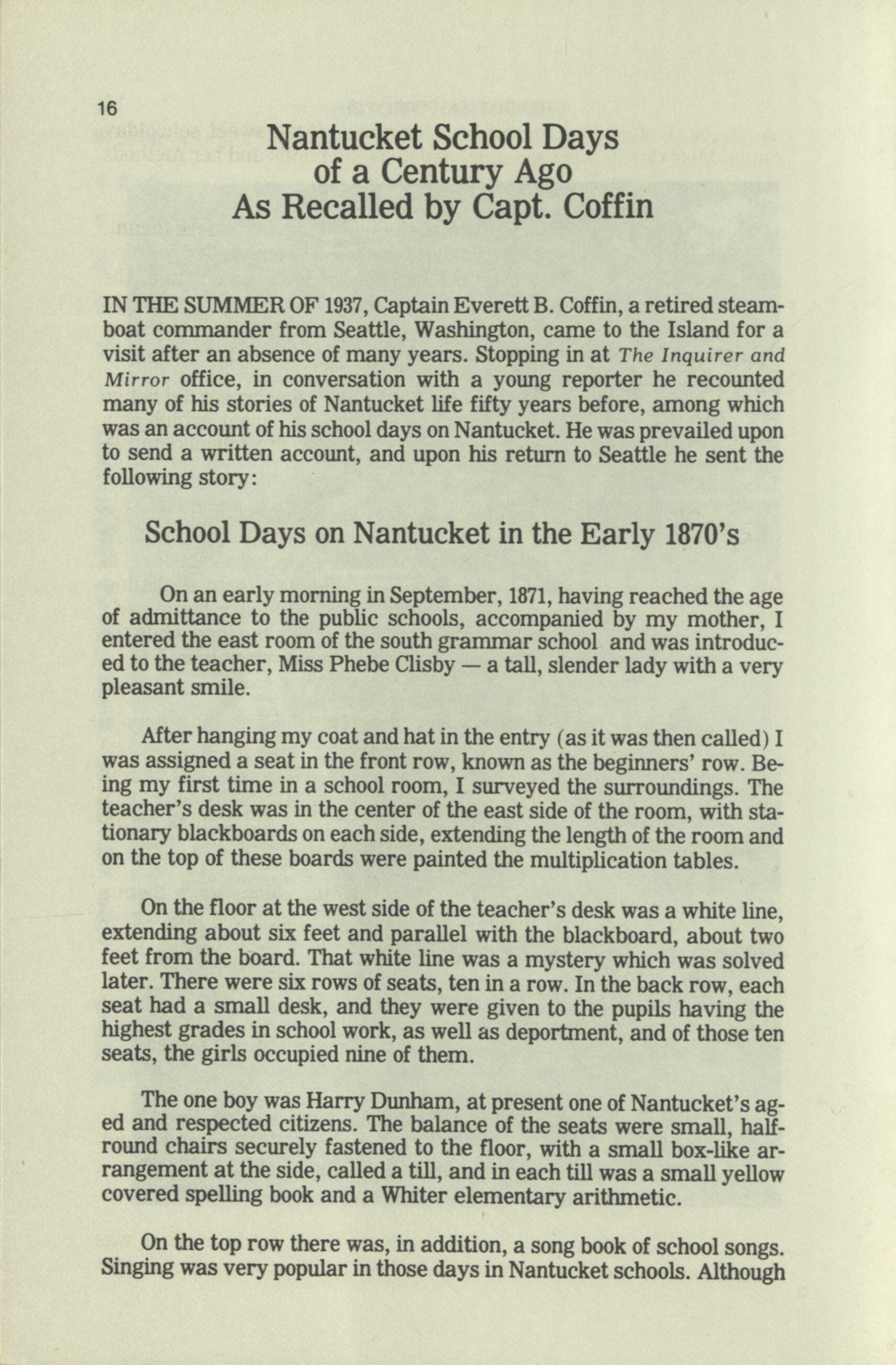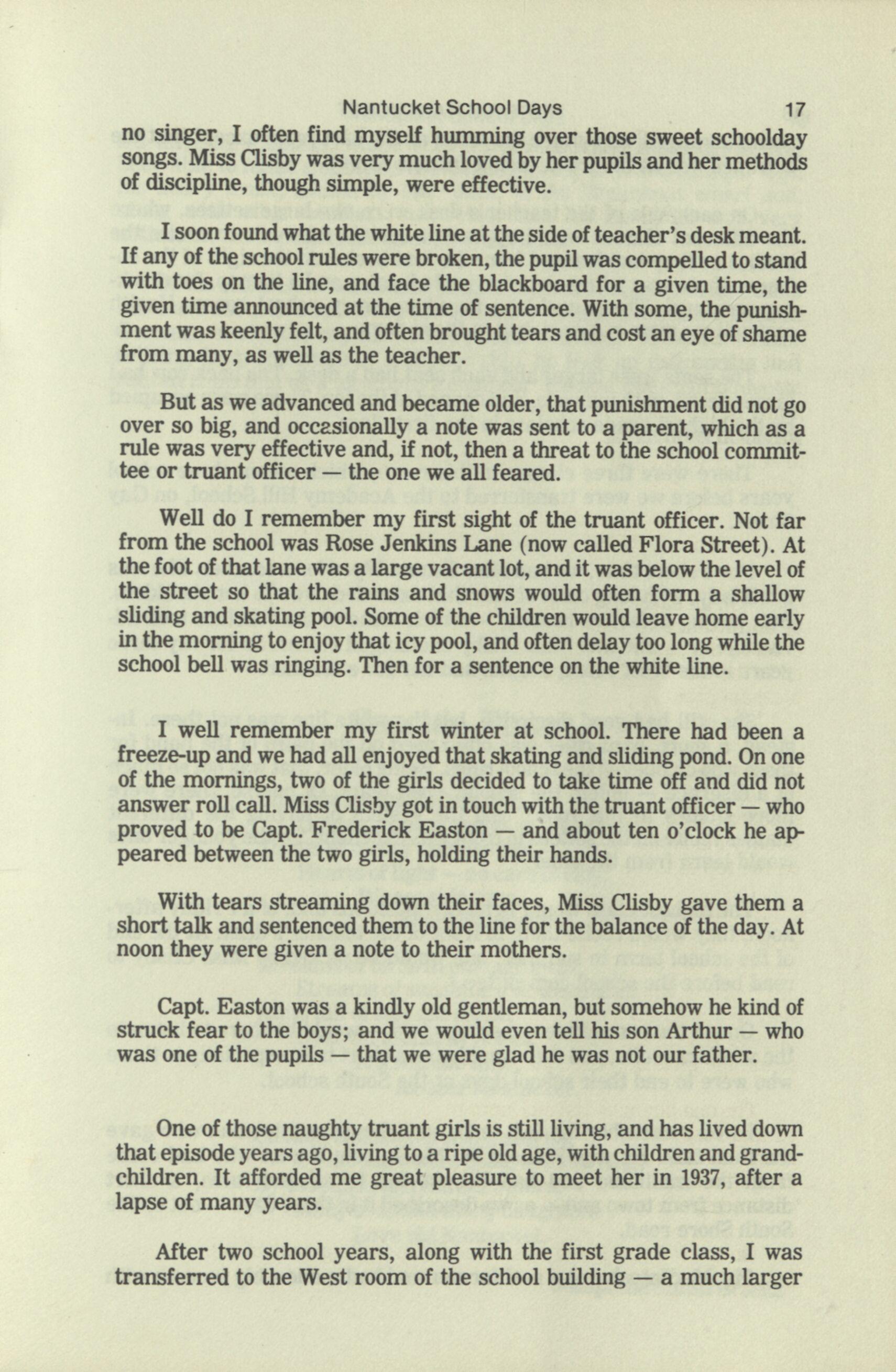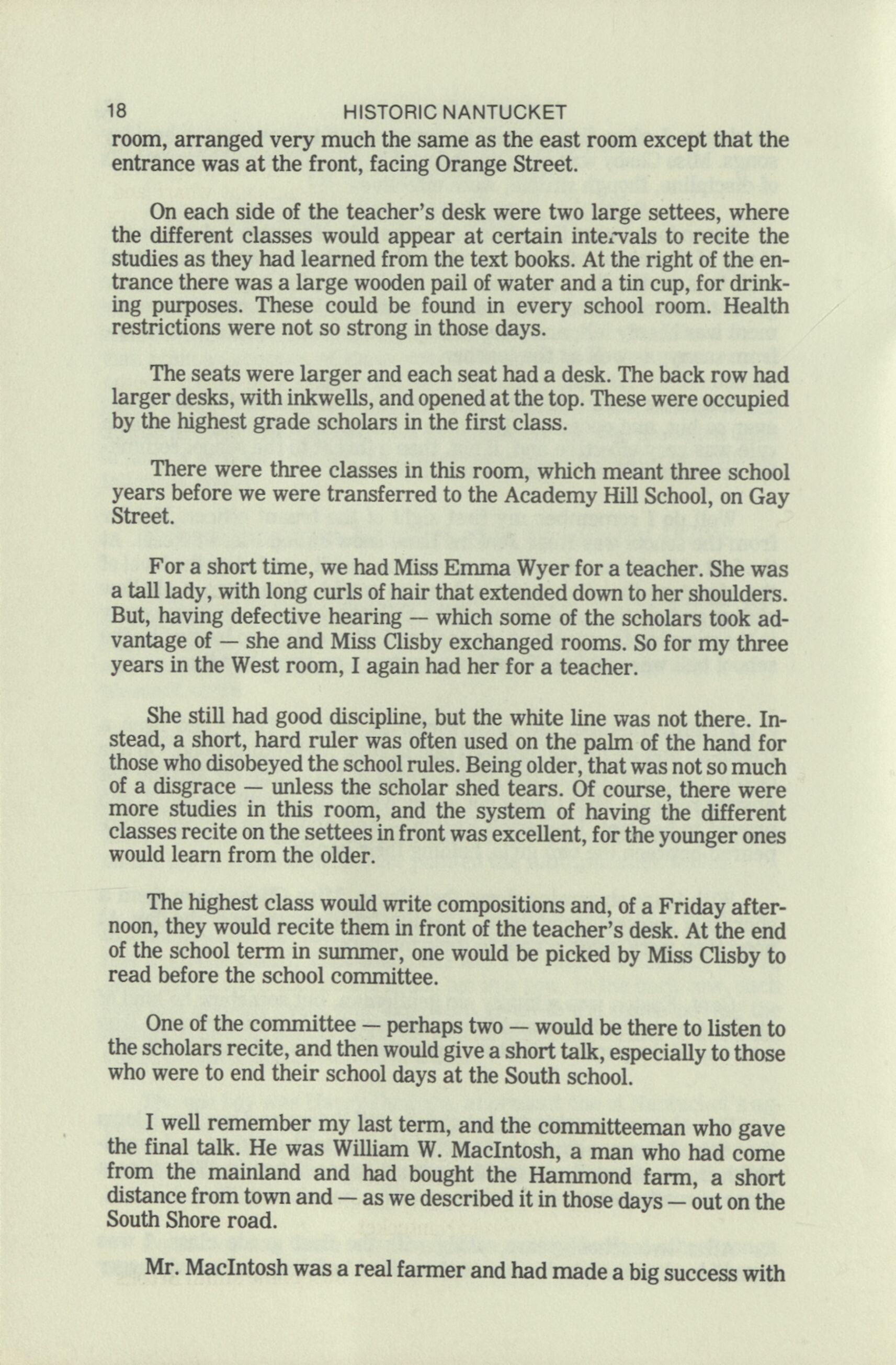
6 minute read
Nantucket School Days of a Century Ago as Recalled by Capt. Everett B. Coffin
Nantucket School Days of a Century Ago As Recalled by Capt. Coffin
IN THE SUMMER OF 1937, Captain Everett B. Coffin, a retired steamboat commander from Seattle, Washington, came to the Island for a v is i t a f ter a n a b se n ce o f m an y y e a r s. S t o p p in g i n a t T h e I n q u i r e r a n d Mirror office, in conversation with a young reporter he recounted many of his stories of Nantucket life fifty years before, among which was an account of his school days on Nantucket. He was prevailed upon to send a written account, and upon his return to Seattle he sent the following story:
School Days on Nantucket in the Early 1870's
On an early morning in September, 1871, having reached the age of admittance to the public schools, accompanied by my mother, I entered the east room of the south grammar school and was introduced to the teacher, Miss Phebe Clisby — a tall, slender lady with a very pleasant smile.
After hanging my coat and hat in the entry (as it was then called) I was assigned a seat in the front row, known as the beginners' row. Being my first time in a school room, I surveyed the surroundings. The teacher's desk was in the center of the east side of the room, with stationary blackboards on each side, extending the length of the room and on the top of these boards were painted the multiplication tables.
On the floor at the west side of the teacher's desk was a white line, extending about six feet and parallel with the blackboard, about two feet from the board. That white line was a mystery which was solved later. There were six rows of seats, ten in a row. In the back row, each seat had a small desk, and they were given to the pupils having the highest grades in school work, as well as deportment, and of those ten seats, the girls occupied nine of them.
The one boy was Harry Dunham, at present one of Nantucket's aged and respected citizens. The balance of the seats were small, halfround chairs securely fastened to the floor, with a small box-like arrangement at the side, called a till, and in each till was a small yellow covered spelling book and a Whiter elementary arithmetic.
On the top row there was, in addition, a song book of school songs. Singing was very popular in those days in Nantucket schools. Although
Nantucket School Days
17
no singer, I often find myself humming over those sweet schoolday songs. Miss Clisby was very much loved by her pupils and her methods of discipline, though simple, were effective.
I soon found what the white line at the side of teacher's desk meant. If any of the school rules were broken, the pupil was compelled to stand with toes on the line, and face the blackboard for a given time, the given time announced at the time of sentence. With some, the punishment was keenly felt, and often brought tears and cost an eye of shame from many, as well as the teacher.
But as we advanced and became older, that punishment did not go over so big, and occasionally a note was sent to a parent, which as a rule was very effective and, if not, then a threat to the school committee or truant officer — the one we all feared.
Well do I remember my first sight of the truant officer. Not far from the school was Rose Jenkins Lane (now called Flora Street). At the foot of that lane was a large vacant lot, and it was below the level of the street so that the rains and snows would often form a shallow sliding and skating pool. Some of the children would leave home early in the morning to enjoy that icy pool, and often delay too long while the school bell was ringing. Then for a sentence on the white line.
I well remember my first winter at school. There had been a freeze-up and we had all enjoyed that skating and sliding pond. On one of the mornings, two of the girls decided to take time off and did not answer roll call. Miss Clisby got in touch with the truant officer — who proved to be Capt. Frederick Easton — and about ten o'clock he appeared between the two girls, holding their hands.
With tears streaming down their faces, Miss Clisby gave them a short talk and sentenced them to the line for the balance of the day. At noon they were given a note to their mothers.

Capt. Easton was a kindly old gentleman, but somehow he kind of struck fear to the boys; and we would even tell his son Arthur — who was one of the pupils — that we were glad he was not our father.
One of those naughty truant girls is still living, and has lived down that episode years ago, living to a ripe old age, with children and grandchildren. It afforded me great pleasure to meet her in 1937, after a lapse of many years.
After two school years, along with the first grade class, I was transferred to the West room of the school building — a much larger
18
HISTORIC NANTUCKET room, arranged very much the same as the east room except that the entrance was at the front, facing Orange Street.
On each side of the teacher's desk were two large settees, where the different classes would appear at certain intervals to recite the studies as they had learned from the text books. At the right of the entrance there was a large wooden pail of water and a tin cup, for drinking purposes. These could be found in every school room. Health restrictions were not so strong in those days.
The seats were larger and each seat had a desk. The back row had larger desks, with inkwells, and opened at the top. These were occupied by the highest grade scholars in the first class.
There were three classes in this room, which meant three school years before we were transferred to the Academy Hill School, on Gay Street.
For a short time, we had Miss Emma Wyer for a teacher. She was a tall lady, with long curls of hair that extended down to her shoulders. But, having defective hearing — which some of the scholars took advantage of — she and Miss Clisby exchanged rooms. So for my three years in the West room, I again had her for a teacher.
She still had good discipline, but the white line was not there. Instead, a short, hard ruler was often used on the palm of the hand for those who disobeyed the school rules. Being older, that was not so much of a disgrace — unless the scholar shed tears. Of course, there were more studies in this room, and the system of having the different classes recite on the settees in front was excellent, for the younger ones would learn from the older.

The highest class would write compositions and, of a Friday afternoon, they would recite them in front of the teacher's desk. At the end of the school term in summer, one would be picked by Miss Clisby to read before the school committee.
One of the committee — perhaps two — would be there to listen to the scholars recite, and then would give a short talk, especially to those who were to end their school days at the South school.
I well remember my last term, and the committeeman who gave the final talk. He was William W. Macintosh, a man who had come from the mainland and had bought the Hammond farm, a short distance from town and — as we described it in those days — out on the South Shore road.









